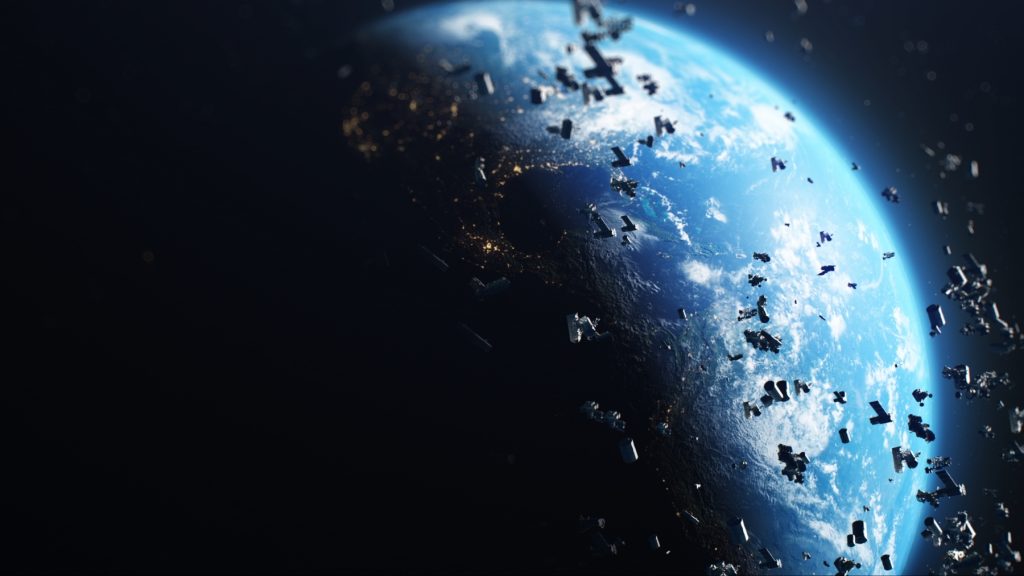
The Saudi Space Agency is exploring ways to save satellites from the danger of space debris.
Experts at a conference organized by the Saudi Space Agency stated that each of us uses about 40 satellites daily for various communication operations. However, according to them, these satellites are threatened by what is called space debris.
Kamal Al-Harbi, head of the Space Services Sector at the Saudi Communications and Space Commission, said that the debris is moving at high speed. If its numbers increase significantly, launching satellites becomes difficult, and the more the debris, the greater the challenge.
The Saudi official explained that about 12,000 satellites have been launched into various orbits. After their lifespan ends and they run out of fuel, they remain as debris that collides and breaks into smaller sizes.
Many companies are working on launching more satellites into outer space, which could reach 30,000 by 2030, increasing the crisis of them becoming space debris.
Mishaal Al-Shamimri, Special Advisor to the CEO of the Saudi Space Authority, said, “This is why it’s important to address this problem. If we don’t do something about this, it will become nearly impossible to launch more satellites into space; that’s why it’s necessary to address the matter now before it gets out of control and affects what we do on the Moon.”
Solutions to the Space Debris Problem
Al-Harbi mentioned that the conference presented solutions to the problem of space debris, such as enacting legislation and laws to regulate this field, in addition to raising awareness to understand and track debris situations, leading to the removal of space debris itself.
He added, “There are some proposed technologies to solve the problem, such as space cleaning robots, but today the challenge is significant as the number of debris is huge, talking about a million pieces the size of 10 cm and 100 million the size of 1 cm.”
Another solution discussed at the conference is making satellites capable of creating a path to return when their life ends, to ensure the cleanliness of space and continue our communications without interruption.
Two commercial companies focusing on space debris removal technologies said they are working to prove their capabilities. One of the companies, named ClearSpace, will prove its capabilities in 2027, and the other company, Astroscale, based in Japan, has already demonstrated some capabilities and will continue to do so. In fact, Astroscale announced during the conference that it would present another demonstration in 6 days, with the main goal being to test these technologies so they can be used.
Enhancing Environmental Sustainability
Al-Harbi confirmed, “Space is considered infrastructure that helps decision-makers in any projects aimed at serving sustainable programs, whether in agriculture, construction, etc. Communications largely rely on satellites and space imaging, which is important in making decisions related to building roads, cities, agriculture, etc. Today, if satellites are disrupted, it will cause a significant problem in sustainable projects.”
Although Saudi Arabia has not contributed to space debris, the Saudi Space Agency launched the first edition of the Space Debris Conference.
Al-Shamimri said, “We wanted to show our commitment to sustainability in space at this conference; because we intend to acquire multiple assets in the growing satellite constellation in space in the future, and we want to do it sustainably and provide satellites with the means to deorbit. We also wanted to bring experts from around the world to address the space debris problem and present commitments and actionable items to address the issue.”
Memorandum of Cooperation and Understanding
The conference witnessed the signing of memoranda of cooperation and understanding with NorthStar and LeoLabs companies, aiming to enhance cooperation in the fields of evaluating and exploring future opportunities, exchanging expertise and knowledge in the field of space situational awareness, and space monitoring.
The conference was organized in partnership with the United Nations Office for Outer Space Affairs (UNOOSA) as a content partner, and the Communications, Space, and Technology Authority as a hosting partner.
Inside Telecom provides you with an extensive list of content covering all aspects of the tech industry. Keep an eye on our Tech sections to stay informed and up-to-date with our daily articles.